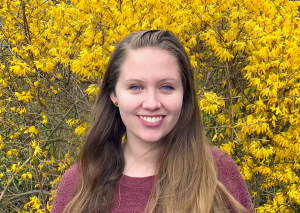Presented By: Aerospace Engineering
Aerospace Engineering Department Seminar: Parametric Design and Isogeometric Modeling for Complex Engineering Applications

Emily L. Johnson
Graduate Research Assistant
Department of Mechanical Engineering
Iowa State University
Among many global engineering challenges, two pressing concerns for current and future generations are healthcare and renewable energy production. In particular, cardiac health and wind energy are difficult or prohibitive to study experimentally due to the scale, cost, and accessibility of the structures. With such complex engineering problems, computational methods provide a suitable alternative to empirical scientific investigation. One challenge associated with computational modeling arises from converting computer-aided design models into a suitable format for traditional analysis methods. When isogeometric analysis (IGA) was originally proposed, it addressed this disconnect by incorporating the same representation of the geometry model for both design and analysis. While IGA has been proven to be an efficient method to facilitate the transition from design to analysis, additional strategies are often necessary when simulating complicated structures using IGA. The presented methods address fundamental challenges related to isogeometric modeling for complex engineering applications and demonstrate effective simulation approaches for multi-component heart valves and wind turbine blades. A framework for parametric design and analysis of tricuspid valves demonstrates the advantages of innovative parameter-based modeling techniques and a coupled design-to-analysis approach that can be applied to many engineering problems, including aerospace and wind turbine structures.
About the speaker...
Emily L. Johnson is a Ph.D. Candidate in Mechanical Engineering and the Wind Energy Science, Engineering, and Policy program at Iowa State University. She received her Bachelor's degree in Physics and Mathematics from St. Olaf College in 2016. At Iowa State, Emily has worked on numerous projects related to isogeometric analysis and computational mechanics for wind turbine blade and heart valve applications. In 2019, Emily received the Graduate College Research Excellence Award in Mechanical Engineering at Iowa State, and she recently received an award for the best presentation by a female graduate student at the 14th World Congress in Computational Mechanics and ECCOMAS Congress. Emily's primary research interests are in parametric modeling and computational mechanics, emphasizing computational design and engineering for aerospace structures, wind energy, and biomedical applications.
Graduate Research Assistant
Department of Mechanical Engineering
Iowa State University
Among many global engineering challenges, two pressing concerns for current and future generations are healthcare and renewable energy production. In particular, cardiac health and wind energy are difficult or prohibitive to study experimentally due to the scale, cost, and accessibility of the structures. With such complex engineering problems, computational methods provide a suitable alternative to empirical scientific investigation. One challenge associated with computational modeling arises from converting computer-aided design models into a suitable format for traditional analysis methods. When isogeometric analysis (IGA) was originally proposed, it addressed this disconnect by incorporating the same representation of the geometry model for both design and analysis. While IGA has been proven to be an efficient method to facilitate the transition from design to analysis, additional strategies are often necessary when simulating complicated structures using IGA. The presented methods address fundamental challenges related to isogeometric modeling for complex engineering applications and demonstrate effective simulation approaches for multi-component heart valves and wind turbine blades. A framework for parametric design and analysis of tricuspid valves demonstrates the advantages of innovative parameter-based modeling techniques and a coupled design-to-analysis approach that can be applied to many engineering problems, including aerospace and wind turbine structures.
About the speaker...
Emily L. Johnson is a Ph.D. Candidate in Mechanical Engineering and the Wind Energy Science, Engineering, and Policy program at Iowa State University. She received her Bachelor's degree in Physics and Mathematics from St. Olaf College in 2016. At Iowa State, Emily has worked on numerous projects related to isogeometric analysis and computational mechanics for wind turbine blade and heart valve applications. In 2019, Emily received the Graduate College Research Excellence Award in Mechanical Engineering at Iowa State, and she recently received an award for the best presentation by a female graduate student at the 14th World Congress in Computational Mechanics and ECCOMAS Congress. Emily's primary research interests are in parametric modeling and computational mechanics, emphasizing computational design and engineering for aerospace structures, wind energy, and biomedical applications.